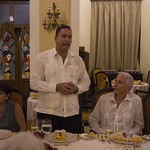Good evening. Thank you for joining us tonight.
This is my first visit to Cuba. Like all visitors I have been greeted with a warm welcome. I am very privileged to be experiencing a country with an extremely interesting history and enormous future potential. In my work, I am fortunate to have seen and experienced much of our world. I am always excited to discover new places. But it is rare to find a place that is as unique as Havana. Being here feels very special.
The International Air Transport Association (IATA)—the organization that I lead—has a big stake in Cuba. That is certainly a part of the special feeling. Seventy years ago, in this very room, IATA was founded. IATA has Cuban roots and we are proud of them. As IATA celebrates its 70th anniversary I am continuing a tradition of IATA Directors General by remembering those roots with a visit to this very interesting country.
One of my predecessors left a plaque just outside this room to commemorate IATA’s 50th anniversary. The hotel Nacional has hosted many meetings since it opened in 1930. Many very colorful and important. Some quite dodgy—we won’t go into that. But I feel very confident in saying that none has created as much long term value as the meeting in 1945, when 57 airlines met to establish a way to work together through association--IATA. And by gathering tonight, you are helping us to celebrate the powerful and positive changes that aviation continues to make in our world as a result.
1945 was a very significant year. Although it marked the end of World War II, the meeting to form IATA took place in April even as war continued to rage. But it was clear that in the post-war world civil aviation would be a force for unity and good. In IATA’s founding documentation, our members recognized that “by marching together we shall, in the long run, cover more ground than by marching alone.” That thought continues to guide us today. In fact, it is the essence of the theme for our year of celebration—Flying better. Together!
IATA’s founding was closely linked to that of the International Civil Aviation Organization (ICAO) in the previous December. Governments too could see the transformational potential of air transport. And in the Chicago Convention governments agreed that, “the future development of international civil aviation can greatly help to create and preserve friendship and understanding among the nations and peoples of the world.”
Together with ICAO, we would set the global standards for aviation to be successful in this role. In the beginning, most international airlines were owned by governments, so the collaboration was quite natural. And it has stood the test of time and many changes. We still fly people—many more than we did in 1945—but the industry has evolved tremendously into the safest form of global mass transit ever. And through this evolution—even to this day—IATA and ICAO are neighbors in Montreal and partners in the leadership of global aviation.
We owe a debt of thanks to Cuba for getting the ball rolling. Dr. Louis Machado of Expreso Aereo Inter-Americano—the predecessor of Cubana de Aviacion—invited the world’s airlines to meet here. His visionary approach to the industry was no coincidence. Prior to that, as the Cuban Ambassador to the US, he represented Cuba in drafting the Chicago Convention.
It is a great honor to have the presence of the Government of Cuba and our friends at Cubana with us this evening. You are the heirs to Cuba’s aviation legacy and leaders of an industry that holds virtually unlimited potential for the Cuban people.
IATA is a business association. Our mission is to represent lead and serve the airline industry. And we do that with the vision that a safe, secure and profitable aviation industry can sustainably connect and enrich our planet. We fulfill this mission and vision independent of politics. But we do pay attention to political developments.
One of the great good news stories in recent months is the warming of relations between Cuba and its neighbor to the north, the United States of America. And we all wait in great hope of the much anticipated establishment of direct scheduled air links between Cuba and the US.
Actually, I am pleased to say that IATA is doing more than waiting. Earlier today I announced that we intend to start our financial systems to support the distribution of air tickets in Cuba before the end of 2016. It will be one of our major projects for next year—of course working with our stakeholders here.
We also stand ready to help advise on the significant upgrading of infrastructure that will be needed to accommodate growth. The way that people travel is rapidly changing with technology. With IATA’s Cuban roots in mind, our team has a vision that the redevelopment of the infrastructure in Cuba offers the opportunity to become a model of modern travel in the region.
Cuba’s historical leadership role in the Caribbean, central location, rich cultural heritage, natural tourism assets and evolving business opportunities—are all things that you know better than I. And that leads me to the conclusion that there is nowhere to go but up for Cuban aviation and the many benefits that growing air connectivity will bring to this important island nation. Our optimistic forecast would see total traffic to/from/within Cuba rise to 13 million by 2034. And talking to people here, I am getting the sense that even that may be conservative.
IATA is committed to contributing to Cuba’s exciting aviation future. And I promise that we shall always be proud of our founding principles which were laid in this room and to which we remain committed. Aviation is a force for good in our world. And through IATA, airlines are indeed flying better together!
Thank you and enjoy the rest of this evening.

